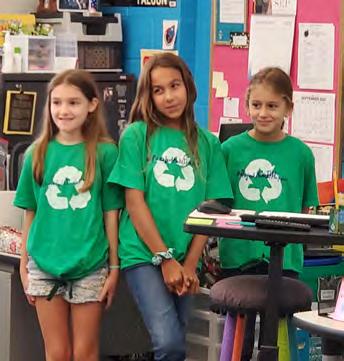
3 minute read
Grow Environmental Awareness at Their School Girls in Green

By Melissa Donovan
Sitting in the Rainbow Elementary School lunch room this past September, fifth grader Leia Faubert noticed a student throw their plate of spaghetti in the trash. Disappointed to see someone waste their food, she turned to her friends Elly Thomas, and Corrine Reese, to discuss a potential solution. Known as the Girls in Green, Faubert, Thomas, and Reese created Project Make it Happen.
“It means a lot to us that kids don’t waste unfinished food even though we sometimes do it too,” Faubert said. “But that’s what we’re learning from it that we hope that everybody else can learn from it too.”
The original idea for the project was to set up a compost bin in their classroom where students could put their unfinished food and produce soil for a garden full of vegetables they were planning to grow. Thomas said she had grown up with a compost bin at her house, and the other girls were familiar with practicing eco-friendliness from a lesson they learned in their fourth-grade class.
They said they bring unfinished food to the compost most days after lunchtime and work on the garden before or after school or at recess. So far, they have grown lettuce, kale, carrots, and marigolds in the garden at school.
When the trio first discussed ideas for their project, they said they later proposed it to their teacher, Melissa McDonald.
“I was pretty happy for them to have such a great idea,” McDonald said. “At recess, they came out with their notepads and pencils, putting together ideas. And then I’d ask more questions, and they would do more research and figure things out. I was pretty excited for them.”
McDonald said her role is to keep the girls on track. She said when they first came to her with the idea, it was quite a lot they were looking to do- all of which she did not feel was manageable for the time being. One of the items the girls thought of was a big fundraising event at Trotwood park with raffles and games, but before getting started on anything, McDonald said she wanted to get approval from the principal.
While all three girls said presenting their idea to the principal was nerve-wracking, their principal approved their idea to have their compost in the classroom and host a fundraiser at the school. They hosted a bake sale that many of their friends and classmates attended and made over $700 to raise money for more efforts toward their project supplies.
“It felt good that a lot of friends in our class helped out,” Reese said. “I think they think it is going to help and like a lot of our friends support us doing it.”
Along with the confidence from their family, friends, and classmates, Thomas said there are still some people who aren’t as open about it.
“The girls really support us, but the boys kind of joke about it sometimes,” Thomas said.
As time passes, the girls have been able to reap some of the rewards of their work. They brought home some purple kale over winter break to take care of it amid the freeze and learned to harvest their plants to ensure a prosperous garden.
From there, they have been able to grow lettuce and make sandwiches and treats for some of the teachers with it.
“We even put things on Facebook, you know, just kinda showing the rainbow families, when you supported us at our bake sale, this is what we were able to buy, and here’s the garden that we were able to create. So everyone can see where these girls take action,” McDonald said.
Though the project has progressed from an idea the girls came up with at recess to something they see tangible results of, they said they do not plan on stopping. The girls want to increase the number of compost bins in their school and be able to grow more in their garden with the soil produced. They even discussed pursuing it in middle school and finding students to take over the project at Rainbow once they leave.
“I think we hope that others will care about how much it’s important to us and that they’ll see that we really care about it, and then they’ll care about it, too. And then it will continue for a few years and hopefully for a long time,” Faubert said.








